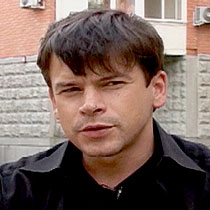2007年VOA标准英语-Russian Journalists Face Life and Death Struggl
时间:2019-02-11 作者:英语课 分类:2007年VOA标准英语(七月)
Moscow
09 July 2007
The New York-based Committee to Protect Journalists says 13 journalists have been murdered because of their reporting since Russian President Vladimir Putin assumed power in the year 2000. The list, issued in April, is entitled "Russia: 13 Murders, No Justice." Anya Ardayeva reports.

Andrei Kalitin
Andrei Kalitin is an investigative reporter for Russia's Channel One television station. He recently completed a book about the murky 1 aluminum 2 industry in Russia of the 1990s.
On June 14th, an unidentified gunman shot him in the shoulder outside his apartment building. Kalitin says he is convinced it was not a robbery. He believes the attack was connected with his job. "I am convinced it was an assassination 3 attempt. I don't believe it had anything to do with hooliganism because there was no conflict, and hooligans just don't shoot this way, when they point at you, take their time and then shoot."
But 13 of Kalitin's colleagues have died, including Novaya Gazeta newspaper reporters Anna Politkovskaya and Igor Domnikov; the editor of the Russian version of Forbes, Paul Khlebnikov; and a number of other journalists believed to be victims of contract-style killings 5.
Media freedom watchdogs first became alarmed in January 2001, when Russian state gas monopoly Gazprom took control of NTV, the last independent nation-wide television network.

Mikkhail Meinikov
Mikhail Melnikov is deputy director of the Moscow-based Center for Journalism 6 in Extreme Situations. He says the fact the cases of murdered journalists remain unresolved, creates fear among the journalistic community and makes these attacks even easier for those who plot them. "What is the point to kill a journalist, if someone who orders his killing 4 would know that this information will become public anyway. OK, they kill one guy, but there will be another and another, dozens of them, who will pick up this topic and expose those responsible. We don't have that."
One of the reasons is that Russian public opinion and Russian officialdom seem indifferent to the plight 7 of journalists.
Andrei Kalitin is bitter. "No one needs honest journalism in Russia these days. I am not only talking about what I am doing, I am talking about what my colleagues are doing, some serious investigations 8. No one pays attention. Before, criminal cases were started after our publications; some people were caught and put into prison. This was all serious. Now nobody cares."

Television control room
And Mikhail Melnikov says it is not exactly the Russian president, but authorities at lower levels and often journalists themselves who avoid writing about certain topics in order to keep their jobs -- and lives. "Don't write about anything that could uncover corruption 9 in power organs, for example, connections between power organs and crime. Don't write about law enforcement organs. Don't write about Chechnya in a negative way. Don't write about the so-called 'hot spots' in a way that it would make it look like state catastrophe 10. Write posititvely, bring more positive emotions."
This "positive news" policy was exactly the reason why several reporters from the nation-wide radio agency Russian News Service quit their jobs in May after, they charge, new editors demanded they bring the amount of "negative news" down to 50 percent of airtime and banned all live reports.
Some of them quickly found new jobs. Dmitri Mungalov now works for the Russian edition of "Newsweek". "We had our own editorial policy, which was all about full objectivity, and presenting two points of view on every subject. But after the new editors came about, it was clear that none of that is going to continue."
But there are others whose job of an investigative report is a threat to their lives no matter who they work for, even for a state-controlled TV network. Andrei Kalitin says, "If I say I am not scared, I would look like an idiot. Honestly, I am afraid and I don't know what's coming next. It might get even worse. But I am going to do what I was doing, because it was vitally important to me. I can't do my job any other way, so I have to do it. It's just it will be scarier now.
Kalitin says that although the police have shown willingness to investigate the attack, he doubts the gunman who shot him will ever be found.
- She threw it into the river's murky depths.她把它扔进了混浊的河水深处。
- She had a decidedly murky past.她的历史背景令人捉摸不透。
- The aluminum sheets cannot be too much thicker than 0.04 inches.铝板厚度不能超过0.04英寸。
- During the launch phase,it would ride in a protective aluminum shell.在发射阶段,它盛在一只保护的铝壳里。
- The assassination of the president brought matters to a head.总统遭暗杀使事态到了严重关头。
- Lincoln's assassination in 1865 shocked the whole nation.1865年,林肯遇刺事件震惊全美国。
- Investors are set to make a killing from the sell-off.投资者准备清仓以便大赚一笔。
- Last week my brother made a killing on Wall Street.上个周我兄弟在华尔街赚了一大笔。
- His statement was seen as an allusion to the recent drug-related killings. 他的声明被视为暗指最近与毒品有关的多起凶杀案。
- The government issued a statement condemning the killings. 政府发表声明谴责这些凶杀事件。
- He's a teacher but he does some journalism on the side.他是教师,可还兼职做一些新闻工作。
- He had an aptitude for journalism.他有从事新闻工作的才能。
- The leader was much concerned over the plight of the refugees.那位领袖对难民的困境很担忧。
- She was in a most helpless plight.她真不知如何是好。
- His investigations were intensive and thorough but revealed nothing. 他进行了深入彻底的调查,但没有发现什么。
- He often sent them out to make investigations. 他常常派他们出去作调查。
- The people asked the government to hit out against corruption and theft.人民要求政府严惩贪污盗窃。
- The old man reviled against corruption.那老人痛斥了贪污舞弊。
- I owe it to you that I survived the catastrophe.亏得你我才大难不死。
- This is a catastrophe beyond human control.这是一场人类无法控制的灾难。